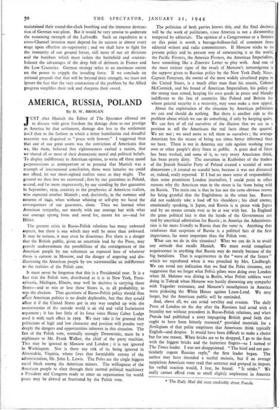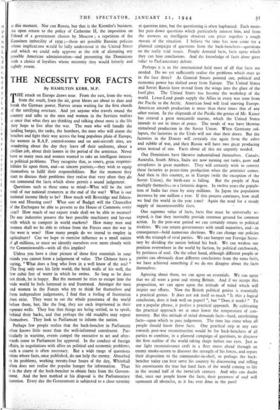AMERICA, RUSSIA, POLAND
By D. W. BROGAN
JUST after Munich the Editor of The Spectator allowed me to discuss with great freedom the damage done to our prestige in America by that settlement, damage due less to the settlement itse:f than to the fashion in which a bitter humiliation and dreadful necessity was disguised as " peace with honour." I suggested then that one of our great assets was the conviction of Americans that we, like them, 'believed that righteousness exalted a nation, that wt shared all or most of their democratic moral and political beliefs. To display indifference to American opinion, to write off these moral prepossessions as unimportant or to pretend that Munich was a triumph of international conciliation, these were luxuries we could not afford, let our short-sighted realists sneer as they might. The ground we then lost we recovered ; first by our guarantee to Poland, second, and far more impressively, by our standing by that guarantee in September, 1939, contrary to the prophesies of American realists, who expected another Munich ; and, decisively, in the summer and autumn of 194o, when without whining or self-pity we faced the consequences of our guarantee, alone. Then we learned what American sympathy, not merely 'with our courage but with what our courage sprang from and stood for, meant for us—and for Hitler.
The present crisis in Russo-Polish relations has many awkward aspects, but there is one which may well be more than awkward. It may be serious, it may even be disastrous. For there is a danger that the British public, given an uncertain lead by the Press, may gravely underestimate the possibilities of the estrangement of the American people by too vehement art espousal here of whatever thesis is current in Moscow, and the danger of angering and dis- illusioning the American people by too statesmanlike an indifference to the realities of the Polish case.
It must never be forgotten that this is a Presidential year. It is a fact that the Polish vote, distributed as it is in New York, Penn- sylvania, Michigan, Illinois, may well be decisive in calving those States—and to win or lose those States is, in all probability, to win the election. That questions of Russo-Polish policy shOuld thus affect American politics is no doubt deplorable, but that they would affect it if the United States got in any way tangled up with the controversies of the outside world is an old and valid Isolationist argument ; it has lost little of its force since Henry Cabot Lodge used it with such effect in 1919. We may take it for granted that politicians of high and low character and position will ponder very deeply the dangers and opportunities inherent in this situation. The fate of the Polish vote, normally strongly Democratic, must be a nightmare to Mr. Frank Walker, the chief of the party machine. This may be ignored in Moscow and London ; it is not ignored in Washington. Nor is there any risk of its being ignored in Alexandria, Virginia, where lives that formidable enemy of the administration, Mr. John L. Lewis. The.Poles are the single biggest racial block among the American miners. The willingness of the American people to elect through their normal political machinery a President and Congress ready to enter an organisation for world peace may be altered or frustrated by the Polish vote.
The politician of both parties knows this, and the final decision will be the work of politicians, since America is not a dictatorship tempered by editorials. The opinion of a Congressman or a Senator on this point is worth a barrage-balloon-full of comment from editorial writert and radio commentators. If Moscow sticks to its present policy and its present way of announcing it to the world, the Pacific Firsters, the America Firsters, the American Imperialists, have something like a Zinoviev Letter to play with. And one of the most sinister signs of the result of Moscow's intransigence is
the support given to Russian policy by the New York Daily News. Captain Patterson, the owner of the most widely circulated paper in
the United States, is a much abler man than his cousin, Colonel McCormick, and his brand of American Imperialism, his policy of the strong man armed, keeping his own goods in peace and blandly indifferent to the fate of countries like Poland and Britain for whom general security is a necessity, may soon make a new appeal. About the exploitation of the situation by American politicians we can and should do nothing. But there is another side to the
problem about which we can do something, if only by keeping quiet. We can first of all rid ourselves of the illusion that we are in
position to tell the Americans the real facts about the quarrel. We are not ; we need more to tell them to ourselves ; the average American has the means of being ten times better informed than we have. There is not in America any rule against washing your own or other people's dirty linen in public. A great deal of linen
has been washed, and some of it, so very many Americans think, has been pretty dirty. The execution in Kuibishev of the leaders of the Jewish Socialist Party of Poland created a scandal of some dimensions ; it created no scandal here, because it was not discussed or, indeed, really reported. If I had no more sense of responsibility than some prominent London journalists, I could point to other reasons why the American man in the street is far from being sold on Russia. The main one is that he has not the same obvious reason for being grateful that the Englishman in the street has. Russia did not -suddenly take a load off his shoulders ; his chief enemy, emotionally speaking, is Japan, and Russia is at peace with Japaa and by no means certain ever to be at war with her. In England the great political fact is that the hands of the Government are tied by uncritical admiration for Russia ; in America the Administra- tion is far more friendly to Russia than the voter is. Anything that reinforces that suspicion of Russia is a political fact of the first importance, far more important than the Polish vote.
What can we do in this situation? What we can do is to avoid any attitude that recalls Munich. We must avoid compliant acquiescence in anything that Russia may do merely because of the big battalions. That is acquiescence in the " wave of the future" which we reprobated when it was preached by Mrs. Lindbergh. We can avoid any indication that we find the Poles tiresome, any suggestion that we forget what Polish pilots were doing over London when M. Molotov was dining in Berlin, what Polish soldiers were doing in Tobruk when Moscow was hastily disowning any sympathy with Yugoslav resistance, and Moscow's mouthpieces in America were picketing the White House against Lease-Lend. We may forget, but the American public will be reminded.
And, above all, we can avoid servility and evasion. The daily Press of London on the day after the Russians had acted with a brutality not without precedent in Russo-Polish relations, and when Pravda had published a story • impugning British good faith that ought to have been bitterly resented,* provided materials for a florilegium of that polite emptiness that Americans think typically English—and despise. It would have been difficult to make a choice but for one reason. When bricks are to be dropped, I go to the firm with the biggest bricks and the butteriest fingers—so I turned to The Times leader. I was not disappointed. "The brief and not par- ticularly cogent Russian reply," the first leader began. The author may have intended a tactful meiosis, but if an average suspicious American voter read that sentence and grasped its import, his verbal reaction would, I fear, be brutal. " It stinks." We really cannot afford even to smell slightly unpleasant in America * The Daily Mail did react creditably about Pravda.
at this moment. - Nor can Russia, but that is the Kremlin's business. An open return to the policy of Catherine II, the imposition on Poland of a government chosen by Moscow ; a repetition of the Kuusinen imbecility of 1939 ;--these are possible Russian policies whose implications would be fully understood in the -United States and which we could only approve at the risk of alienating any possible American administration—and presenting the Dominions with a choice of loyalties whose necessity they would bitterly and rightly resent.



























 Previous page
Previous page